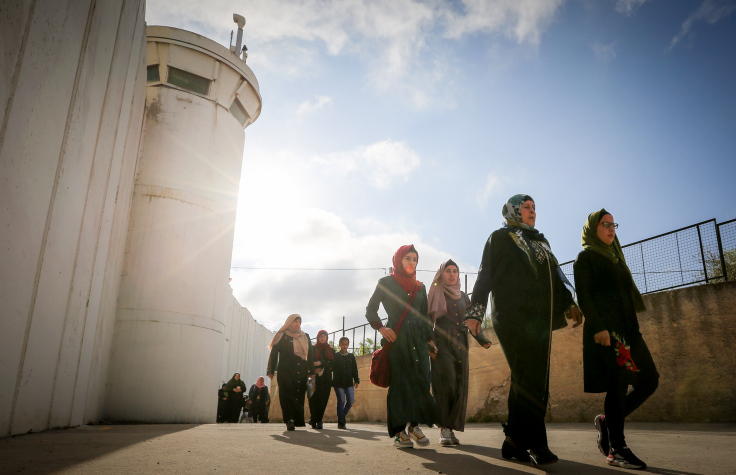Palestinians have no say over whether they will be ruled by messianic religious zealots or by generals who previously presided over the occupation.

On September 17, Israelis will return to the polls for round two of an election cycle that failed to determine an outcome in April, this time hoping for a different result. While there are some substantive differences between incumbent Prime Minister Benjamin Netanyahu and former IDF Chief of Staff Benny Gantz, when it comes to peace with the Palestinians the outcome matters much less. Neither Netanyahu nor Gantz is inclined or capable of positively altering the reality on the ground and paving the way toward a permanent settlement of the Israeli-Palestinian conflict.
The central tension in Israeli politics today is not between pro- and anti-peace forces, but between security-focused pragmatists and religious-nationalist ideologues, both of them hailing from various points on the right side of the political spectrum. Moreover, for perhaps the first time, the ideologues in Israel are mirrored by likeminded counterparts in the White House. This has added real weight to their ability to act on their ideological positions despite vocal opposition from the security establishment.
The Israeli left, for its part, is politically irrelevant today and has been out of power for most of the past four decades. There are a number of reasons for this stemming from the collapse of the peace process, the violence of the Second Intifada, and the Labor Party’s decision over many years to empower and accede to the settlement movement.
But at least as salient a reason is that the left undermined its own policy position regarding peace by blaming and discrediting their partners in the Oslo Accords — the Palestinian leadership — for its ultimate failure. Whether valid or not, in doing so, they joined the Israeli right in claiming that Israel had no partner for peace, making it nearly impossible to resurrect the process once the dust from the intifada had settled. Today, the left lacks clarity on the issue of peace, and instead focuses much of its political program on economic issues and on slowing the anti-democratic wave sweeping the country.
Meanwhile, the pragmatists in the Blue and White party are focused on stability and security. This mainly involves prolonging the (not-so-static) status quo in the occupied territories, which has served Israel well, while finding some type of accommodation with the Palestinians or at least their autocratic leadership. Managing the situation without bothering to solve it is encapsulated by their slogan: “Preserving a horizon for a future deal.” If the pragmatists can ultimately settle the conflict by granting limited sovereignty to a truncated, territorially dismembered Palestinian state, then they will likely pursue that option.
Crucially, however, the pragmatists will not risk igniting a civil war within Israel by uprooting a significant amount of the more than 620,000 Jewish settlers from the West Bank, including East Jerusalem (one conservative estimate puts the minimum number of evacuees at 160,000). Even Blue and White candidate Yair Lapid, who is more to the left than his compatriots, is against Israel dividing Jerusalem at all, or accommodating a number of Palestinian positions on final status issues. Unless the Palestinians are willing to go much further than ever before in giving up on previous demands, this process will not produce results.
But that is not to say that the Palestinian Authority led by Mahmoud Abbas would not be inclined to come to better terms with the pragmatists on preserving the status quo, from which they derive power, status, and material gain — even at the expense of their own people. The pragmatists view the steps taken by the Trump administration to strip its financing to the Palestinian Authority, their security forces, and humanitarian institutions like the United Nations Relief and Works Agency, which provides services for Palestinian refugees, as counterproductive and unnecessarily destabilizing.
Israel’s security establishment has come to rely on its close coordination with Palestinian security forces, and the existence of the Palestinian Authority has proven far more effective from an Israeli standpoint in administering the Palestinian population than the direct military occupation that preceded its creation in the early 1990s.

Along with Gantz, Blue and White leaders Moshe Ya’alon and Gabi Ashkenazi have all overseen Israel’s occupation of the West Bank and Gaza as heads of the country’s military, and thus see the utility in propping up the PA. The ideologues on the other hand, represented by Netanyahu’s coalition, want to destroy every expression and manifestation of Palestinian nationalism, including the PA, which they perceive as an obstacle to absolute Jewish control over “Judea and Samaria.”
The ideologues would like to incorporate these territories into the state of Israel through annexation, while denying the native Palestinian population of citizenship — which Netanyahu has been busy promising ahead of the election. According to some of the arguments being made, the Palestinian population can — if it behaves — continue to reside on the land as permanent residents, but not as equal citizens with Jewish Israelis. If Palestinians misbehave by resisting their inferior status, then they can leave, through force if necessary.
The ideologues have no room for accommodation or settlement with the Palestinians, least of all if it means a non-Jewish sovereign entity coming into existence in any part of Greater Israel. The ideologues and their supporters in the United States see no problem in undermining the Palestinian Authority and bringing it to the point of collapse — in fact, they yearn for it.
The current U.S. Ambassador to Israel, David Friedman, made many of these same arguments in the press shortly before entering office. In one op-ed penned in February 2016, he called for ending “the two-state narrative,” which he said was a “damaging anachronism.” In less-than-subtle advocacy for Israel to annex the West Bank, he said Palestinians don’t care if their leader is Mahmoud Abbas or Benjamin Netanyahu, adding, “a Palestinian state is the last thing the [Palestinian] middle class wants — they know better than anyone how corrupt and inept their people are at self-government.”

Since becoming ambassador, Friedman has only echoed these opinions, which do not augur well for the Trump administration’s impending peace plan, expected to be revealed sometime after the September 17 election. Friedman is one of three co-authors of the plan, alongside Trump’s son-in-law, Jared Kushner, who maintains close ties with Netanyahu, and personal lawyer Jason Greenblatt, who recently resigned from his post. American pressure on Israel to make compromises that might amount to a final settlement will probably be less than forthcoming.
Indeed, if Netanyahu secures yet another term, we are likely to see synergy in American policy and the Israeli ideological right wing like never before. The consequences could be disastrous for peace. By permanently precluding an independent Palestinian state, the right is setting the stage for another major confrontation between Israelis and Palestinians. This time, perhaps, along existential lines, since the future of the Zionist project would be at risk.
But even if Gantz and co. secure a victory in the election, they will have to form a coalition in order to govern, and that coalition-building from the left or the right or both will make sure whatever the prime minister’s intentions, a permanent peace with the Palestinians will be the remotest of possibilities.

